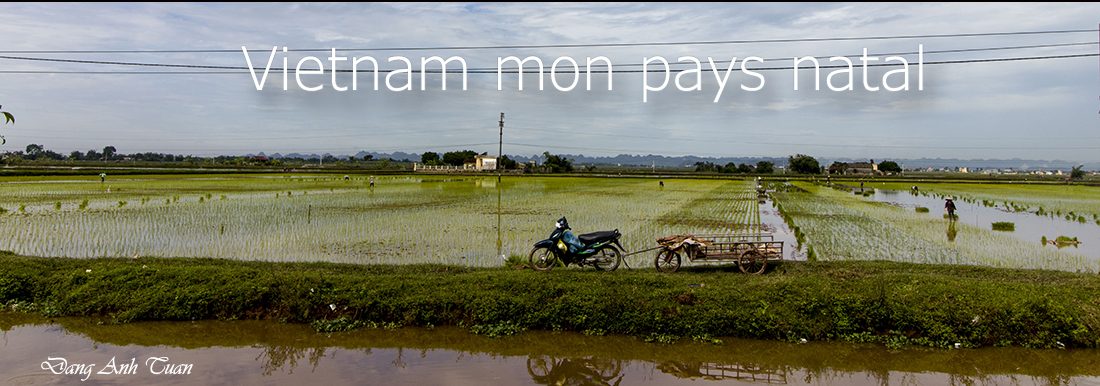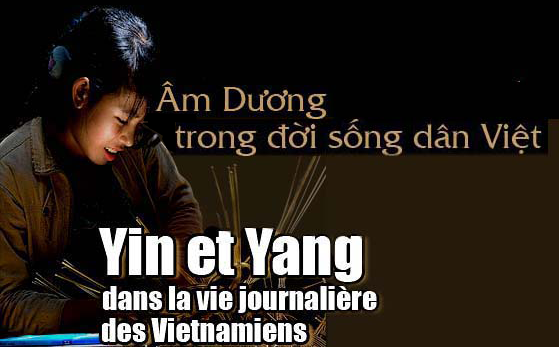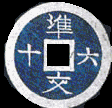By speaking of the couple circle/square, one wants to evoke the perfection and happy union. That is why one is accustomed to say in Vietnamese: « Mẹ tròn, con vuông » for wishing the mother and her child a good health a the time of birth. This expression has been bequeathed by our ancestors with the aim of retaining our attention on the creative character of universe. The roundness and square are two foms taken not only by rice cakes (Bánh Chưng, Bánh Tết) or married couple cakes (Bánh Su Sê ou Phu Thê) but also Vietnamese old coins (or copper cash pieces). The form of this latter is related to the Vietnamese traditional cosmology: their roundness evokes that of sky and the central hole is square as soil.
Old coin
For the surface of this old coins, there is always a percentage to be respected: 70% for the round part and 30% the square part. One also finds two forms with the bamboo rod held by the eldest son by walking after the coffin during the funeral procession of his father. When the deceased is his mother, he is obliged to walk backwards before the coffin. It is the protocol « Cha đưa mẹ đón» (Accompagny the father, receive the mother) to be respected in Vietnamese funeral rituals. The rod bamboo represents the father’s righteousness and endurance. It is replaced by an other plant known under the name « cây vong » and symbolizing the simplicity, sweetness and flexibility when the deceased is the mother. The rod must have the round head and square leg for symbolizing the Heaven and the Earth while the median part of rod is reserved for children and descendants. That means everyone needs the protection of the Heaven and the Earth, the education of parents and mutual assistance between brothers and sisters in the society. For showing the respect, the number of times which the invited person is obliged to accomplish by bending his back in the state of prostration before the coffin is a Yin number (or an even number)(i.e. 2 or 4) because the deceased is going to the darker world of Yin nature (Âm phủ in Vietnamese). In the past, one had the habit of putting in the deceased mouth a scrap of gold in order to breathe the mana contained in the precious metal into him. Being of Yang nature, the gold is able to assume the body preservation and prevent the putrefaction. At the time of the agony of the deceased, his family members must give him a surname (or in Vietnamese tên thụy) which is known only by them with the agreement of home genius because at the anniversary of his death, this surname will be called in order to invite him to participate in offerings and avoid waking others lost souls. That is why one is accustomed to say in Vietnamese tên cúng cơm for reminding that everyone has a surname. Likewise, the bunch of flowers offered to funerals must be constituted of an even number of flowers (or Yin number).
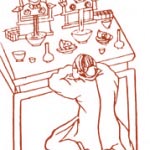 There is an exception to this rule when one is dealing with Buddha or deceased parents. Before the altar of this later, one is accustomed to put 3 incense sticks in the vase or one gets down completely on his knees with head on ground by repeating an odder number of times (Yang number) because one always consideres them as living beings. Likewise, for showing the respect towards seniors, one only accomplishes one or three times in prostration. However, in marriage rites, the future wife must bow down before her parents for thanking them from the birth and education received before joining the family of her husband. It is an even number (or Yin number) of times she will accomplish (i.e. 2) because she is considered « dead » and does not belong to her original family. There is a custom for the ceremony of first wedding night. Being supposed to be good, honest, old enough and having many children, a woman takes charge of spreading and overlapping of a pair of mats on the nuptial bed: one of these mats is open, the other upside down in the image of Yin and Yang union.
There is an exception to this rule when one is dealing with Buddha or deceased parents. Before the altar of this later, one is accustomed to put 3 incense sticks in the vase or one gets down completely on his knees with head on ground by repeating an odder number of times (Yang number) because one always consideres them as living beings. Likewise, for showing the respect towards seniors, one only accomplishes one or three times in prostration. However, in marriage rites, the future wife must bow down before her parents for thanking them from the birth and education received before joining the family of her husband. It is an even number (or Yin number) of times she will accomplish (i.e. 2) because she is considered « dead » and does not belong to her original family. There is a custom for the ceremony of first wedding night. Being supposed to be good, honest, old enough and having many children, a woman takes charge of spreading and overlapping of a pair of mats on the nuptial bed: one of these mats is open, the other upside down in the image of Yin and Yang union.
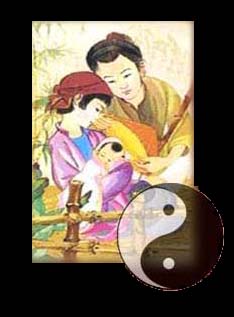 In ancien times, young married men are accustomed to exchange mutually a pinch of earth against a pinch of salt. They would like to honour and sustain their union and fidelity by taking the Heaven and the Earth as the witnesses of their engagement. One also finds the same signification in the following expression: Gừng cay muối mặn for reminding young married men that they should not leave themselves because the life is bitter and painful with ups and downs as ginger and it is intense and deep with feelings as salt.
In ancien times, young married men are accustomed to exchange mutually a pinch of earth against a pinch of salt. They would like to honour and sustain their union and fidelity by taking the Heaven and the Earth as the witnesses of their engagement. One also finds the same signification in the following expression: Gừng cay muối mặn for reminding young married men that they should not leave themselves because the life is bitter and painful with ups and downs as ginger and it is intense and deep with feelings as salt.
For speaking of virtue, one is accustomed to say in Vietnamese:
Ba vuông sánh với bảy tròn
Đời cha vinh hiễn đời con sang giàu
As three squares can be in comparison seven circles, virtuous parents will have rich children.
By speaking of these three squares, one needs to reminder the square form of rice cake proposed during the new year. This cake constituted by straight lines symbolizes loyalty and righteousness in the relationship of three submissions « Tam Tòng »: Tại gia tòng phu, xuất giá tòng phu, phu tữ tòng tữ (submission to the father before her marriage,submission to the husband during her marriage, submission to the elder son when widowed).
About 7 circles, one must think of the roundness of « bánh giầy ». This one is constituted by a sequence of dots equidistant from the center where there is the heart. This cake is the symbol of a well-balancel soul that any passion does not bewinder. One finds in this heart the perfection of seven human sentiments: (Thất tình : hỹ, nộ, ái, lạc, sĩ, ố, dục )( Joy, anger, sadness, cheerfullness, love, hatred, desire). Does someone realize a ideal moral life if under any circumstances, he succeeds to maintain the loyalty and righteousness with others and always keeps his equidistant gap in the manifestation of his feelings?
The expression vuông tròn has frequently been employed in a great number of Vietnamese popular sayings:
Lạy trời cho đặng vuông tròn
Trăm năm cho trọn lòng son với chàng!
I pray to God that everything should go well and I should eternally keep my faithful hearth with you.
or
Đấy mà xử ngãi (nghĩa) vuông tròn
Ngàn năm ly biệt vẫn còn đợi trông
Here is the signification of conjugal love
Despite the eternal separation, one continues to wait for the return with patience
or in the following verses 411-412 and 1331-1332 of Kim Vân Kiều‘s best-seller
Nghĩ mình phận mỏng cánh chuồn
Khuôn xanh biết có vuông tròn mà haỵ
My fate is fragile like the dragonfly’s wing
Does the Heaven knows that this union is durable or not?
or
Trăm năm tính cuộc vuông tròn,
Phải dò cho đến ngọn nguồn lạch sông
During your lifetime (hundred years), when you are concerned by your marriage, you must climb up the river to the source (i. e. you must get informed in the smallest detail).
This bipolarity Yin and Yang is visible in various forms in Vietnam. In China, an only genius of marriage is seen, one has in Vietnam a couple of geniuses, a man and a woman (Ông Tơ Bà Nguyêt). Likewise, in Vietnamese pagodas, one finds on the altar a couple of Buddhas (a man and a woman) (Phât ông Phât Bà) in place of one Buddha. The Vietnamese strongly believe that each of them is associated with a certain number of digits. Before the birth, the embryo needs to wait for 9 months and 10 days. For speaking of someone having a happy destiny, one says he as the « good luck » (số đỏ). On the contrary, the » bad luck (số đen) » is reserved to people having a lamentable destiny. NEXT (Yin and Yang numbers)
